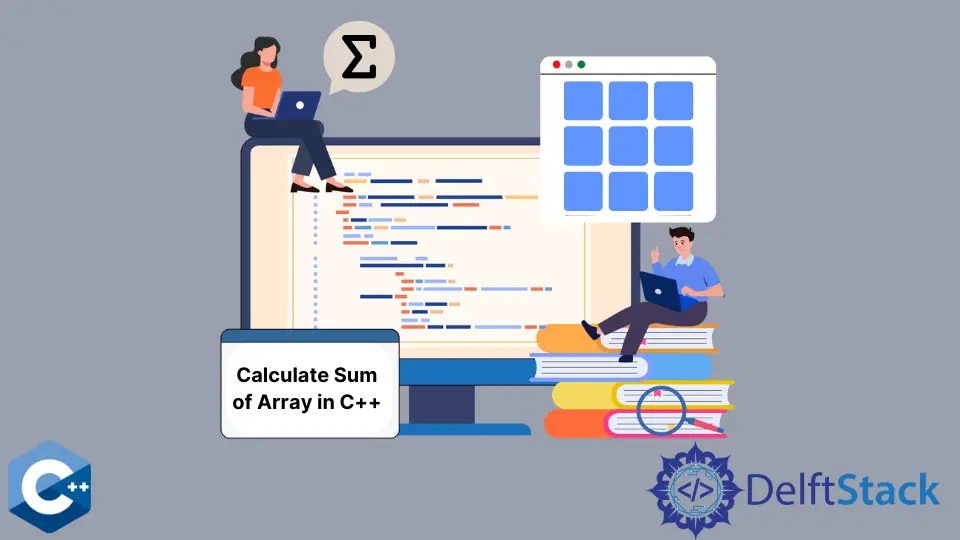在 C++ 中計算陣列的總和

本文將介紹幾種如何在 C++ 中計算陣列元素之和的方法。
使用 std::accumulate 函式來計算 C++ 中的陣列元素之和
std::accumulate 是 STL 庫中標頭檔案 <numeric> 下包含的數字函式的一部分。std::accumulate 是一個通用函式,適用於給定範圍內的元素,該範圍由相應迭代器表示的前兩個引數指定。第三個引數用於傳遞總和的初始值,該初始值可以是物件的文字值。在這種情況下,我們演示了一個動態整數陣列,該陣列儲存在 std::vector 容器中。注意,std::accumulate 可以選擇採用二進位制函式物件型別的第四個引數來代替加法運算。在下一個示例程式碼中對 std::accumulate 的第二次呼叫演示了這種情況,唯一的區別是乘法被用作二進位制運算。
#include <iostream>
#include <numeric>
#include <vector>
using std::accumulate;
using std::cin;
using std::cout;
using std::endl;
using std::vector;
template <typename T>
void printVector(vector<T> &vec) {
for (const auto &item : vec) {
cout << item << ", ";
}
cout << endl;
}
int main() {
vector<int> arr1 = {1, 12, 13, 10, 11};
printVector(arr1);
int arr1_sum = accumulate(arr1.begin(), arr1.end(), 0);
cout << "sum of arr1 = " << arr1_sum << endl;
int arr1_product =
accumulate(arr1.begin(), arr1.end(), 1, std::multiplies<>());
cout << "product of arr1 = " << arr1_product << endl;
return EXIT_SUCCESS;
}
輸出:
1, 12, 13, 10, 11,
sum of arr1 = 47
product of arr1 = 17160
使用 std::partial_sum 函式來計算 C++ 中子陣列的部分和
同一標頭檔案提供的另一個有用的數字函式是 std::partial_sum,該函式將給定範圍內的子範圍相加。該函式提供的介面與上一個介面相似,不同之處在於,第三個引數應該是將儲存計算所得數字的範圍的起始迭代器。在這種情況下,我們用相加的結果覆蓋現有的向量元素。注意,也可以用 std::partial_sum 指定自定義二進位制操作,以更改預設選項-加法。
#include <iostream>
#include <numeric>
#include <vector>
using std::cin;
using std::cout;
using std::endl;
using std::vector;
template <typename T>
void printVector(vector<T> &vec) {
for (const auto &item : vec) {
cout << item << ", ";
}
cout << endl;
}
int main() {
vector<int> arr1 = {1, 12, 13, 10, 11};
printVector(arr1);
std::partial_sum(arr1.begin(), arr1.end(), arr1.begin());
printVector(arr1);
std::partial_sum(arr1.begin(), arr1.end(), arr1.begin(), std::multiplies());
printVector(arr1);
return EXIT_SUCCESS;
}
輸出:
1, 13, 26, 36, 47,
1, 13, 338, 12168, 571896,
或者,這些功能也可用於在給定範圍內的元素之間進行按位運算。例如,以下程式碼片段對 vector 元素進行 XOR,並將結果值儲存在相同範圍內。
#include <iostream>
#include <numeric>
#include <vector>
using std::cin;
using std::cout;
using std::endl;
using std::vector;
template <typename T>
void printVector(vector<T> &vec) {
for (const auto &item : vec) {
cout << item << ", ";
}
cout << endl;
}
int main() {
vector<int> arr1 = {1, 12, 13, 10, 11};
printVector(arr1);
std::partial_sum(arr1.begin(), arr1.end(), arr1.begin(), std::bit_xor());
printVector(arr1);
return EXIT_SUCCESS;
}
輸出:
1, 13, 0, 10, 1,
Founder of DelftStack.com. Jinku has worked in the robotics and automotive industries for over 8 years. He sharpened his coding skills when he needed to do the automatic testing, data collection from remote servers and report creation from the endurance test. He is from an electrical/electronics engineering background but has expanded his interest to embedded electronics, embedded programming and front-/back-end programming.
LinkedIn